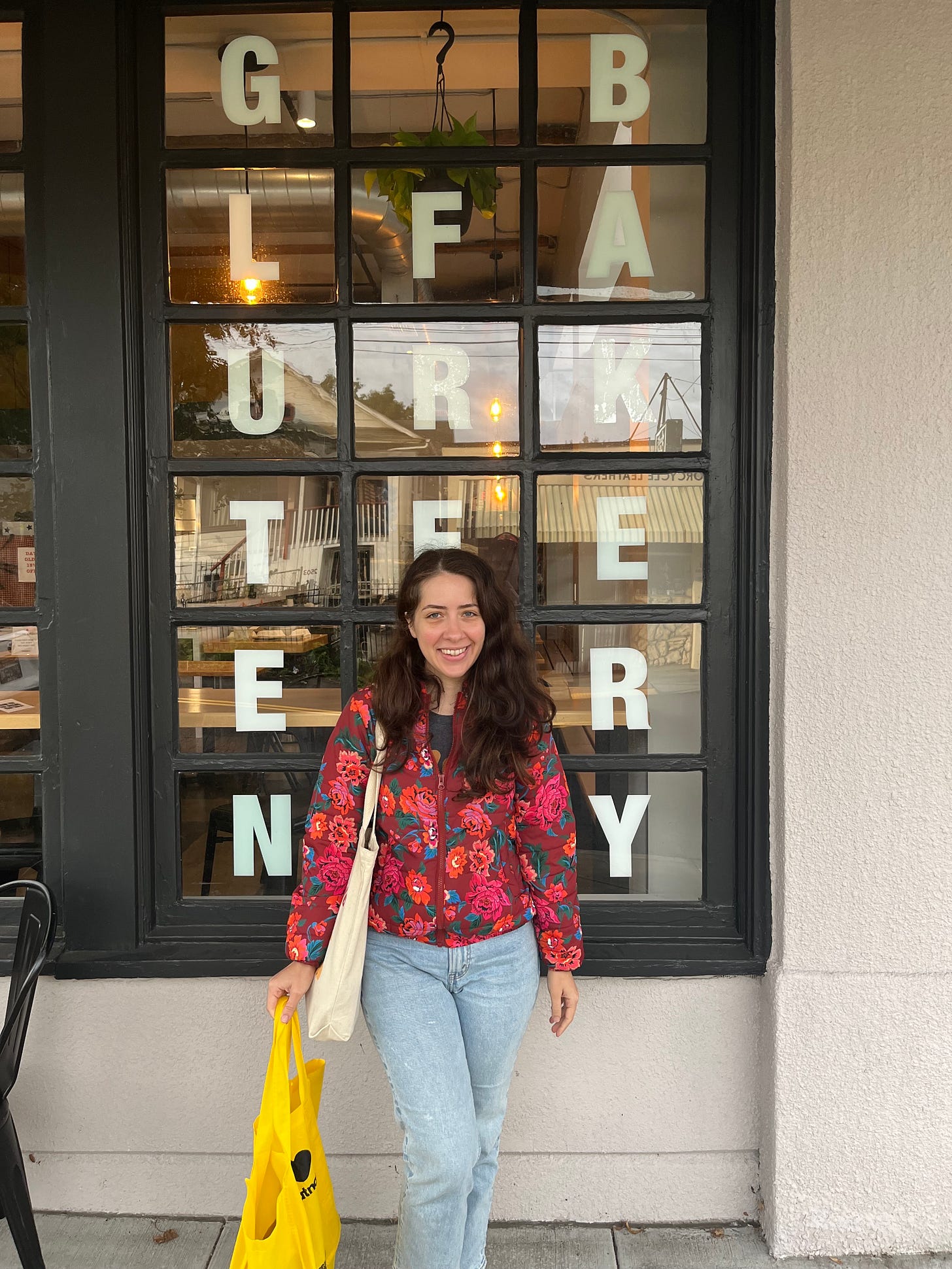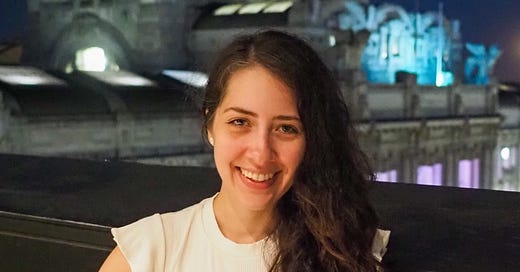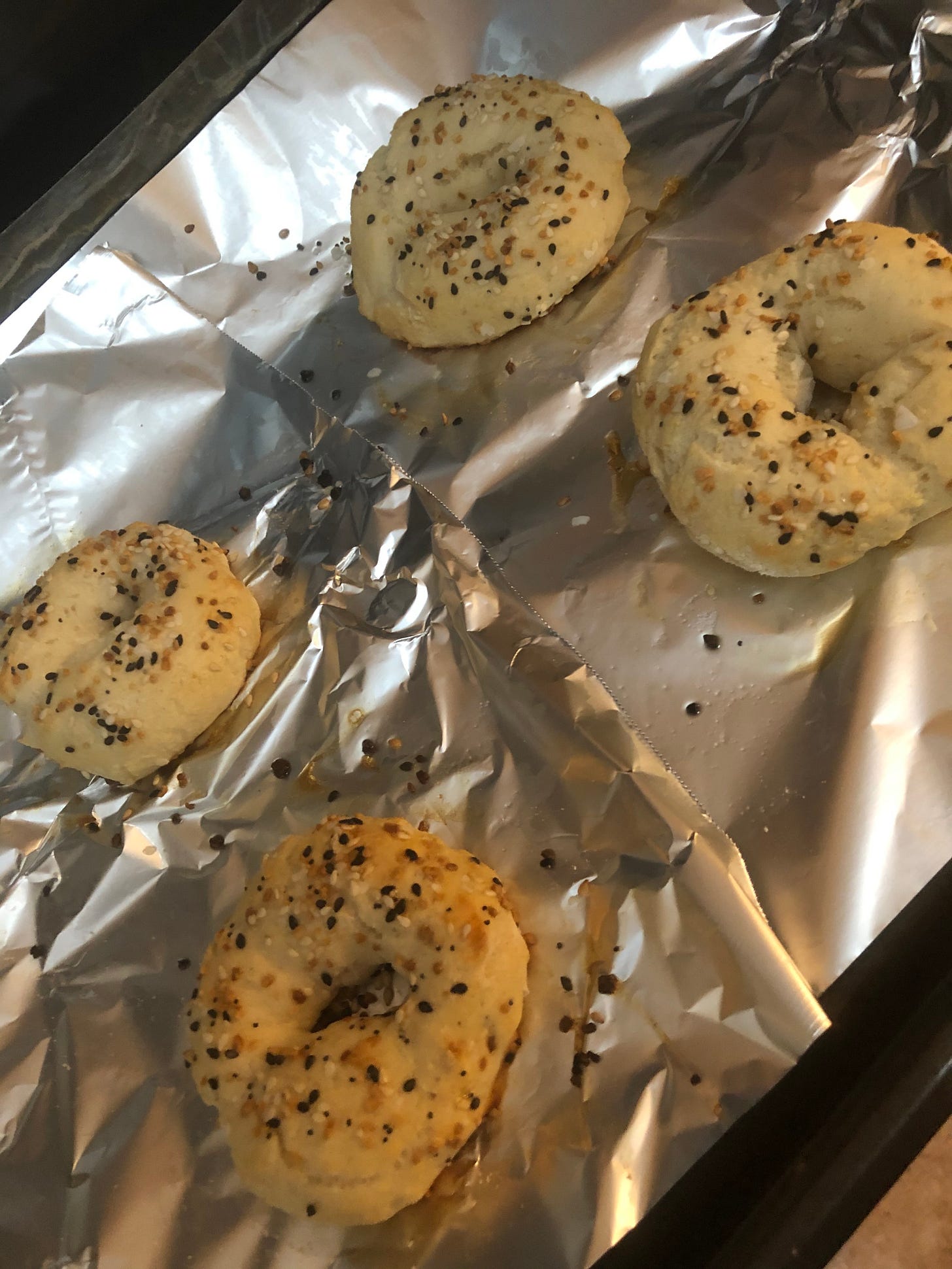Guest Post: How Being Diagnosed With Celiac Disease Transformed My Health
Plus, a few key takeaways you can learn from my diagnosis
Hello, Friend! Happy Tuesday!
I sincerely hope you’re enjoying this blog! I imagine you’re learning new and insightful things about nutrition, or, at the very least, are entertained by my thoughts! If you would like to help support this newsletter, please consider becoming a paid subscriber for just $5 per month. This contribution makes a tremendous difference.
If you aren’t already subscribed, or would like to upgrade your subscription, you can do so below. As always, thank you for reading!
It’s an exciting day! We’ve got a guest post by ! Christina is a health writer and editor living in New York City. She is the founder of the newsletter, where she provides tips for navigating life with celiac disease. She also contributes to a variety of online publications, including aSweatLife, Shape, and Vitamin Shoppe’s blog, and is an ambassador for Beyond Celiac. If you’re gluten-free, have celiac disease, know someone who does, or simply want to learn more about it, I highly recommend subscribing to Christina’s newsletter!
Please enjoy Christina’s article about how she discovered she had celiac disease, what she went through to get a diagnosis, and how the changes she has made since have positively impacted her life. Thank you for sharing, Christina! —Sara
I dealt with uncomfortable stomach pain for many years as a teenager and young adult in my 20s. I chalked up the regular bloating, gas, constipation, and heartburn as my normal. Everyone’s body is different, and this was just how mine worked, right? But when I hit 30 a few years ago, my abdominal discomfort started getting worse.
I knew something was wrong, but I didn’t know what, exactly, was going on. Many doctors over the years told me I just had acid reflux. They’d put me on a course of prescription strength antacids for a few months and tell me to cut out alcohol and coffee and eat bland foods. That seemed to help for a while, but then I’d go back to my regular lifestyle and feel crappy again.
The diagnosis that changed my health for the better
Everything came to a head in January 2020 when I was 31 years old. I started to experience more intense pain, including a sharp, persistent burning on the left side of my chest. I was also bloated all the time, felt very gassy, and couldn’t stop burping anytime I ate or drank anything. My symptoms wouldn’t go away no matter how many OTC antacids I popped.
I booked an appointment with a new GI doctor and described my symptoms to her, almost in tears from the pain. She scheduled me for an endoscopy the following month. I was pretty nervous going into the endoscopy because I had never been under anesthesia before. But the procedure wasn’t anywhere near as scary as I thought it would be. It was over so quickly, and I felt like I had taken the best nap ever!
Right away, my doctor told me I had a peptic ulcer and gastritis and gave me a treatment plan. This included going back on a prescription-strength antacid for a couple of months and changing my diet to consist of mostly bland foods until the ulcer healed.
My doctor also mentioned that she biopsied my intestines for conditions including celiac disease, lactose intolerance, and even cancer, but those results wouldn’t come in for a couple of weeks. When I went in for a follow-up appointment in early March 2020, my doctor told me my intestines showed signs of celiac disease, a genetic autoimmune disorder that causes your body to launch an immune response when you eat gluten and damages the cells that line your small intestine.
I was shocked. At the time, I had a couple of acquaintances with celiac disease, but even though I’ve worked as a health writer and editor for most of my career, I honestly knew next to nothing about the condition. And because it’s genetic and no one in my family had ever been diagnosed with celiac disease, it never crossed my mind that I might have it.
I had blood taken at my doctor’s office that day to confirm the diagnosis and also to test for vitamin and mineral deficiencies since those are common in people with celiac disease due to the intestinal damage caused by the condition. Then, as you can probably guess by the timeline, everything shut down where I live, in New York City, at the start of the pandemic.
Two weeks passed after my follow-up appointment and I still hadn’t heard from my doctor because her office was closed and she wasn’t meeting with patients in person. I finally got in touch with someone in her office, and she called me back saying the blood work confirmed I did, indeed, have celiac disease. She also told me I was borderline deficient in vitamin D, but thankfully, I didn’t have any other nutritional deficiencies.
We had a virtual appointment the following week, where she gave me some basic information about celiac disease (the only “treatment” currently available is adhering to a strict gluten-free eating plan). She recommended I meet with a dietitian to get more specific information about how to navigate gluten-free living and tailored advice on which vitamins I should take based on my specific nutritional needs.
Although I was sad about not being able to eat my favorite foods anymore, overall, I was relieved to finally have an answer about what was causing my digestive woes for all of these years. Fast-forward to four years later, and I can say that I’ve never felt better physically in my adult life. I no longer deal with bloating, gas, and constipation like I used to—and according to a follow-up endoscopy I had in 2023, my intestines had healed from the damage!
Navigating my new life with celiac disease
Working with a dietitian at the beginning of my diagnosis was incredibly helpful because I didn’t know where to start when it came to going gluten-free. My dietitian was able to teach me how to read food labels and spot hidden sources of gluten (did you know soy sauce contained gluten? I sure didn’t!), offer easy recipe ideas, and provide guidance on supplementation.
I won’t sugarcoat things, though: Navigating life with celiac disease certainly came with difficulties early on. Like I mentioned earlier, I definitely grieved the loss of my favorite foods, including pizza and bagels (two New York City staples). But I’ve been able to recreate some of my favorites using gluten-free ingredients at home!
My biggest challenge didn’t come until about a year after my diagnosis, though. I consider myself lucky that I was diagnosed with celiac disease at the beginning of the pandemic because it gave me time to educate myself and get comfortable with being gluten-free. But once the world started opening back up and my friends started to get together again for meals, I struggled.
When you have celiac disease, it’s not enough to order something from the menu that’s labeled gluten-free. How the food is prepared is just as important because eating even a teeny amount of gluten can cause intestinal damage (even if it doesn’t make someone feel sick).
I would have to grill restaurant staff about how they cooked their gluten-free items to ensure there wasn’t a risk of cross-contact, which is the term for when a gluten-free food comes into contact with gluten-containing food or surfaces that have been used with gluten-containing foods. That meant asking questions like, “Do you have a separate fryer for French fries?” and, “Do you boil your gluten-free pasta in the same water as the regular pasta?”
At first, I felt awkward asking these questions—and depending on the restaurant, sometimes I’d be met by blank stares from the waiter. But it’s gotten more routine to ask over time. It’s basically second nature to me now. And luckily, there are a few dedicated gluten-free restaurants and bakeries in New York City, which makes things easier!
Key takeaways from my celiac diagnosis
While there are certainly difficulties that come with living with celiac disease (especially when it comes to dining outside the home), I consider myself lucky that I was able to find an answer to what was causing my stomach issues for so many years. If you’ve unexplained symptoms that you’re trying to get to the bottom of, I hope I can offer a few takeaways from my experience that will help you on your own health journey.
Listen to your gut—literally.
If something feels off, go to the doctor to get it checked out. I had symptoms for many years and didn’t push for answers until the pain became close to unbearable. When I look back, I can’t believe I put up with feeling so bloated and gassy for that long.
Of course, getting answers is easier said than done. Quite frankly, it wasn’t until I went to a woman GI doctor that I felt my symptoms were taken seriously. You may need to visit a few doctors until you find the right one for you—but trust me, it’s worth it if you can get to the root cause of your symptoms and find relief.
Enlist the right support.
There’s no way I would’ve been able to navigate my celiac diagnosis alone. Working with a dietitian at the beginning of my diagnosis was a must. She was able to teach me about gluten and all of the places it could be hiding and explain what questions I’d need to ask when I went to restaurants.
She even contacted a few meal kit companies on my behalf to ensure they were actually celiac-safe. If you’re dealing with gut issues, I definitely suggest enlisting a dietitian, nutritionist, or health coach because they really can help make navigating things easier.
Additionally, about a year after my diagnosis, I applied to be an ambassador for the nonprofit organization Beyond Celiac. Through my work as a volunteer ambassador, I’ve made many celiac friends. It’s so nice to be connected with people who understand the struggles unique to this disease.
If you’ve been diagnosed with a health condition, I suggest seeing if there are any organizations or support groups you can reach out to so you can be connected to others with your condition. Being able to talk to someone who’s gone through the same things you have really does go a long way.

Prioritize your mental health.
When I first started on my celiac journey, I simply thought I’d switch to eating gluten-free and start feeling better—and that would be that. But it turned out my diagnosis would have a huge effect on my mental health, which is something research shows is common in people with this condition.
In fact, studies find the “treatment” for celiac disease (strict adherence to eating gluten-free) is more burdensome than the treatment for other conditions—and women with celiac disease, particularly, are at higher risk for depression due to the burdens that come with managing this condition.
In the first six months of my diagnosis, I was so focused on my physical health and making sure I didn’t accidentally eat gluten that I completely neglected taking care of my mental and emotional well-being. While I no longer had digestive issues, I was miserable and knew something had to change.
So, I made a commitment to take care of my mental health as part of managing my celiac disease. This is what has helped me:
I started using meal kits to cut down on my time in the kitchen. This relieved some of the burden I was feeling around having to cook most of my meals. (Hungryroot and Green Chef are two of my favorites!)
I quit drinking alcohol. Instead of alleviating the anxiety I had about my diagnosis like I thought it would, alcohol made it worse. Over two years ago, I nixed it from my life for good and haven’t looked back.
I added yoga and meditation to my weekly routine, working up to practicing three times a week. Studies show both of these activities can help reduce depression and anxiety.
I asked friends and family to help vet restaurants so I didn’t have to do all of the work myself. Knowing the burden wasn’t always on me to research and ask questions felt like a weight off my shoulders.
Finally—and it’s not always easy, I’ll admit—I make sure to give myself plenty of grace. Instead of saying I “messed up” or did something “wrong” when I accidentally eat gluten (which is going to happen occasionally unless I never dine at a restaurant), I show myself kindness and remind myself that it’s all a journey. There will be ups and downs along the way!
Have any questions about celiac disease that I can help you with? Feel free to drop a comment here and I’d be happy to answer!







Thanks for allowing me to share my story with your readers!